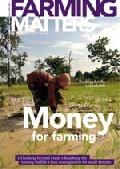Many farmers, in the same way as the organisations that support them, are trying out innovative ways to secure the financial recources they need. These are only a few examples of the many interesting ideas and practices seen in the field.
Farming Matters | 26.2 | June 2010
Malawi: Better decision-making processes
Re-investment in the farm is a critical issue for the sustainability of any farming enterprise and for the enhancement of rural livelihoods. Farmers usually keep seeds of grains, legumes and cereals from their harvest for planting, or they sell their labour during the planting season in order to get paid with seeds which they can then plant. These efforts complement the formal or informal credit options which are sometimes available. But in villages like Katundulu, in Malawi, only nine percent of all households have access to credit. In contrast, many more receive coupons for subsidised fertilizer from the government. In some cases these credits are sold and the money then used for other needs.
The Enabling Rural Innovation (ERI) programme, supported by the International Center for Tropical Agriculture, aims to help farmers make better decisions, and thus make better use of the limited credit available to them. Their approach is to work with local organisations, helping them access and generate market information which farmers can then use. Better decision making patterns lead to better businesses. This, in turn, can lead to more credit options.
Want to know more?
Write to Mariam A.T.J. Mapila, at the Department of Agricultural Economics, Extension and Rural Development, University of Pretoria, South Africa.
E-mail: maleytata@yahoo.com
Nigeria: More options through a strong organisation
How to help farmers get credit without actually providing it? The PROSAB project (Promoting Sustainable Agriculture in Borno State) in Nigeria, implemented by the International Institute of Tropical Agriculture, focuses on the important role which Community Based Organisations (CBOs) can play. CBOs are formal, legal entities, rooted or based in a specific community. This project has trained farmers in 30 communities in Borno State on how to form and register a CBO, and assisted them in the process of doing so.
Over 200 CBOs were formed during the project’s six years life span. Many succeeded in securing loans from NACRDB, the Nigerian Agricultural Cooperative and Rural Development Bank. Others developed a system to provide financial resources using the savings of their members (following the examples of savings and credit co-operatives from many countries). Members of these organisations were also encouraged to work together – for example, by jointly buying inputs, or by making these available to others, with interest. Nowadays, farmers in Borno not only show a strong savings culture (even providing part of their harvests in order to secure future credits); their organisations also give them a stronger bargaining power.
Want to know more?
Write to Kolawole Ogundari, formerly at the PROSAB project, IITA, Ibadan, Nigeria.
E-mail: kolawole.ogundari@agr.uni-goettingen.de
England: Diversification into tourism
Beechenhill Farm is a 37 ha organic dairy farm in the Peak District National Park, in the centre of England. Together with her family, Sue Prince has lived and worked there for 25 years. Although they have access to banks and mortgage corporations, their main source of finance comes from their own tourism business.
At first they used a small bank loan to build two bed-andbreakfast rooms. Having repaid the loan, they used the profit from the B&B to convert an old stable into a romantic cottage for two. Later they converted the old milking barn into a cottage with wheelchair access. As a result, many tourists are able to stay at the farm, and enjoy the peace and the excellent local food. The income from this small business supports the farm and helps Sue and her family to continually improve the quality of the accommodation and services they provide. “Once we started the tourism business, alongside the farm, we didn’t need to borrow any more money – except to finance large developments like building a house for our daughter and son-in-law. And we haven’t had to change anything here to please the tourists: they come to stay because they want to see how we live and work.”
More information?
Please write to Sue Prince by sending an e-mail to the editors, Farming Matters, at ileia@ileia.org.
Brazil: Broad-based revolving funds
The north-eastern region of Brazil has an arid environment. For many decades, the authorities’ response to the difficulties faced by farmers was to build large scale infrastructure, such as dams and reservoirs, which were seen as promoting agriculture. But this hardly benefited small-scale farmers.
Since 1987, CAATINGA, a local NGO, has been promoting the dissemination and replication of locally specific solutions – in particular those which make the best of the little available water. As part of their approach they established a revolving fund. Farmers who receive a loan pay it back either in money or in kind, and this is then “transferred” to another family.
After several years, CAATINGA no longer works directly with families, but with local farmers’ associations. This change has helped them become more efficient and has led to greater involvement of the population. The associations determine the interest rate and assess grant applications. Working through farmer associations has helped CAATINGA reach a much broader audience. At the moment, they are directly working with 39 associations in the state of Pernambuco, and the fund that serves these associations now totals more than 700,000 reais (or US$ 400,000).
Want to know more?
Please write to Burguivol Alves de Souza (burguivol@caatinga.org.br) or to Giovanne Henrique Satiro Xenofonte (giovanne@caatinga.org.br), at CAATINGA

